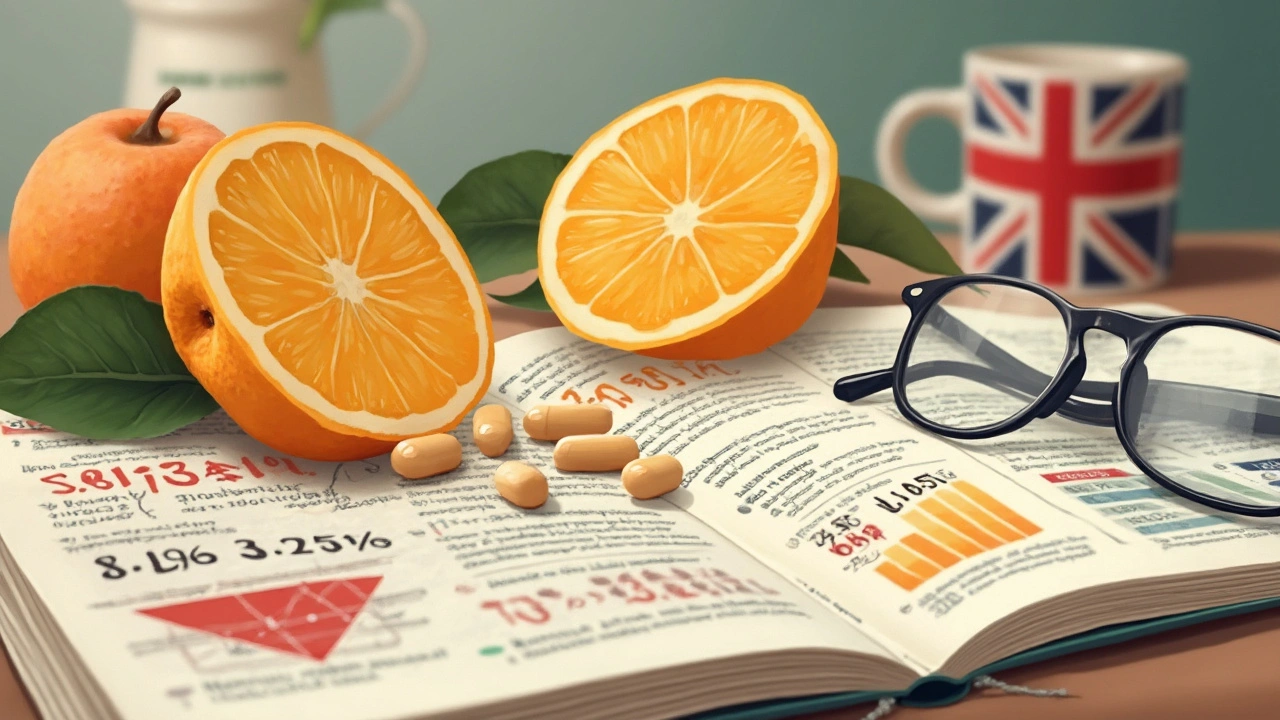If someone told you there’s a small, sour citrus fruit hiding in Calabria, Italy, that could help steady your cholesterol and give your heart a fighting chance, would you be tempted? Bergamot isn’t some mysterious superfood from a far-off land—well, I suppose southern Italy isn’t exactly round the corner—but its potential for health is making people across the UK sit up and pay attention. While it flavours Earl Grey tea, the real action happens with its extract as a dietary supplement. And the more you learn about it, the more you start to think, “Why haven’t I heard about this thing before?”
The Science Behind Bergamot: What Makes It So Special?
Bergamot, or Citrus bergamia, is a fruit that’s not much to look at—kind of like a lime that had a rough night. But when researchers started poking around, they found this humble citrus is packed with a cocktail of useful compounds. Polyphenols are the rockstars here; you’ve probably heard about them in berries and red wine, but bergamot has its own special mix like brutieridin and melitidin, which aren’t found anywhere else. These give bergamot its edge.
Let’s get straight into the cool bits. Years ago, Italian scientists noticed locals from Calabria had surprisingly healthy hearts and low cholesterol, even though their diets weren’t exactly what you’d call light. So they looked at what was growing locally, and bergamot was everywhere. Clinical trials started popping up, mostly out of Italy, and the numbers are kind of wild. One 2019 study (published in Frontiers in Pharmacology) looked at folks with high cholesterol and gave them 500 mg of bergamot extract twice a day for six months. LDL cholesterol (the nasty variety) dropped, on average, by 23%, while HDL (the good guy) crept up by 16%.
But wait—it’s not just about cholesterol numbers. More trials, including a small but telling one from 2022, found that bergamot may improve arterial function and reduce oxidative stress markers in the blood. In plain English? It acts like a broom, sweeping away the sticky gunk in arteries and cooling off inflammation. Not many natural supplements can claim results like that backed by double-blind, placebo-controlled studies.
Take a look at this table that summarises what’s been found in recent science:
| Health Benefit | Key Study Year | Result |
|---|---|---|
| LDL Cholesterol Reduction | 2019 | 23% average drop |
| HDL Cholesterol Increase | 2019 | 16% average rise |
| Blood Sugar Balance | 2022 | Improved fasting glucose in type 2 diabetics |
| Arterial Health | 2022 | Less inflammation, improved vessel function |
Another cool fact: bergamot has almost no sugar but is rich in vitamin C and flavonoids. The magic is that combination of polyphenols, making it a great helper for anyone watching their blood sugar or heart numbers.
One thing people always ask: will bergamot work like statins, the cholesterol-lowering prescription drugs? Honestly, bergamot won’t replace your statin if your doctor says you need it—but it works in a surprisingly similar way. Those same polyphenols nudge your liver to clear out extra cholesterol, just like statins do, but without the usual complaints about muscle aches or blood sugar spikes.
Bergamot isn’t some marketing gimmick, either. The European Food Safety Authority (EFSA) actually lists citrus bergamot as having potential benefits for cholesterol management, when taken in standardized extract form. The trick is getting the right kind. Stick to supplements that clearly list the amount of active polyphenols (ideally 38% or higher) and are standardized to at least 500 mg per dose. Otherwise, you’re basically buying flavoured dust.

How Bergamot Fits into Your Routine: Real-World Ways to Use It
So, you’re probably wondering—how does someone actually use bergamot if they’re not sipping endless mugs of Earl Grey? The easiest way: capsules or tablets, usually marked as ‘citrus bergamot extract’. Most research used doses of 500 to 1,000 mg per day, split into two servings, taken before breakfast and dinner. Why before food? Because it’s absorbed better and gets straight to work nudging your liver into that all-important cholesterol clean-up.
Don’t look for fresh bergamot in Tesco or Sainsbury’s (trust me, I’ve checked Nottingham’s markets)—it’s too sour to eat raw and tricky to ship. That’s why supplements are so much easier. They’re concentrated and standardised, so you get the pure good stuff, not just fruit powder. If you’re vegan or allergic to citrus, watch those labels—some supplements sneak in fillers or are processed in facilities with other allergens.
One thing I love about bergamot is you don’t have to overhaul your whole eating plan just to see its benefits. You keep your morning oats, your roast chicken, your last biscuit (well, maybe not after dinner, let’s be real)—just add your bergamot before the meal and you’re set.
Is bergamot safe? For most healthy adults, yes. But if you’re on prescription meds, always double-check with a pharmacist. Bergamot’s compounds can interact with some blood pressure pills and statins, so don’t play mix-and-match. Most people won’t get side effects, but if you feel stomach pain or odd headaches, give it a break.
Here’s a super simple checklist for anyone thinking about starting bergamot:
- Pick a supplement that says “standardised to 38% polyphenols” on the label.
- Look for vegan/vegetarian friendly options if you need them.
- Stick to 500–1,000 mg per day, split before meals.
- Store in a cool, dry place—this is still citrus, after all.
- Don’t mix with prescription meds unless your doctor gives the OK.
And one thing nobody tells you: bergamot doesn’t taste like lemons or limes—it’s floral, almost a bit herby. So if you’re tempted to break open a capsule, just don’t. The Italians use it to flavour sweets, marmalade, even perfumes. Supplements? Best chased with a glass of water.
If you’re feeling creative (or just want a bit of variety), sprinkle bergamot extract on yoghurt, mix it into smoothies, or even swirl it through salad dressings. Just check your supplement is food-safe and not just meant for swallowing whole. There’s something oddly satisfying about knowing you’re getting heart support and a little zing at the same time.

Surprising Perks: Beyond Heart Health and Into Daily Life
The first thing all the studies mention is cholesterol, but that’s not the only string to bergamot’s bow. Loads of folks stumble on extra benefits after a few weeks—stuff even the scientists didn’t expect at first. People with stubborn high blood sugar, especially those on that slippery slope to type 2 diabetes, have noticed fasting glucose numbers drop slowly. That’s because bergamot’s polyphenols seem to help your body handle insulin signals better, so sugar moves out of your blood and into your cells where it’s meant to be. It’s not magic, but it’s a handy nudge in the right direction.
What about energy or mood? Here’s a fun twist: the same oil that gives bergamot its smell in perfume is also a mood-booster. Aromatherapists use it to dial down stress and anxiety. That’s not to say swallowing capsules will turn you into the calmest person in the queue at Asda, but people do mention feeling steadier, less frazzled. Maybe it’s the predictability of stable blood sugar—and maybe it’s just the boost of doing something good for your body. Either way, there’s something to be said for that happy citrus afterglow.
Let’s get real, though: bergamot won’t undo a deep-fried diet or replace the benefit of moving your legs around Nottingham Forest. If you add this supplement, do it as a bonus, not a miracle. Still, the difference between “fine” and “thriving” is often small, daily habits—like giving your liver a little help, keeping your numbers stable, and maybe getting a whiff of Italian sunshine now and then.
Tips for making it stick? Pop a reminder on your phone or pair it with an easy habit (I put my bergamot next to the kettle—unmissable). Pay attention to how you feel after a month; cholesterol and blood sugar need blood tests to prove change, but how you feel in your skin—clearer head, steady mood, less of that afternoon slump—can be just as telling.
And don’t forget, the world of supplements moves fast—bergamot wasn’t big in the UK ten years ago, but now it’s easy to find in health shops, online, and even some chemists. Quality control matters, so spend a minute reading those labels. The best brands publish third-party tests right on their websites—so you know you’re getting what you pay for, no Italian holiday needed.
So next time you reach for a new supplement, maybe skip the stuff with flashy labels promising the moon. Steady, evidence-backed bergamot might just be what your daily routine is missing—and your heart (and tastebuds) might thank you for it.



Warren Neufeld
I've actually been curious about bergamot for a while now, especially after seeing a few supplements pop up online boasting all these incredible health perks. Cholesterol and cardiovascular benefits sound promising, but I wonder how strong the research backing this really is?
From what I gather, it's sometimes compared to other citrus-derived supplements but with a unique profile. Has anyone here tried it and noticed real changes in their routine health markers?
It's great that the article hints at practical tips and warnings too. Supplements can be pretty tricky, especially if you don't know what to look out for. So a holistic approach is really important.
Overall, I appreciate the scientific angle this article seems to take—it’s refreshing compared to the usual overhyped health claims. Would love to hear more stories or experiences though!
Carys Jones
Honestly, I’m kind of skeptical about this whole bergamot craze. It feels like just another trendy pill that people will blindly pump into their bodies without really understanding what they’re getting into. I mean, sure, benefits sound nice on paper, but where’s the REAL proof?
Every other fruit or supplement gets hyped to the heavens only to fade away when science finally catches up. I’m cautious about these “quick fix” approaches, especially when it comes to serious stuff like cholesterol and heart health.
We need to be more responsible with our health, not just follow the latest fad from some supplement company looking to cash in. If bergamot is truly that effective, cool! But let’s not pretend it’s some magical cure without harsh evidence backing it.
Plus, the supplement industry has such a shady side that I don’t trust many products until I see legit research and clinical trials. That’s my take.
Deborah Escobedo
I think it’s really encouraging to see natural supplements like bergamot getting more attention in the wellness community. It sounds like there’s good reason to believe in its potential, especially for things like blood sugar and cardiovascular health.
Of course, it’s important to approach it with balance and good information. Taking supplements without understanding proper usage or possible side effects can lead to issues, so I appreciate that this article aims to provide practical advice.
For those considering trying bergamot, consulting with a healthcare professional is a must. Everyone’s body reacts differently, and it’s essential to integrate supplements responsibly into your health routine.
Overall, I’m optimistic that bergamot could be another tool to support wellbeing alongside healthy diet and lifestyle habits.
Jonathan Mbulakey
This post got me thinking about how the body metabolizes compounds from fruits like bergamot compared to whole fruit intake. It’s fascinating when supplements isolate certain active elements versus getting the entire nutrient package from food.
There’s often a philosophical question here: are we improving health by focusing on single compounds, or does that detract from the holistic effects that come from a balanced diet? In the end, health is complex and reducing it to pills might be an oversimplification.
But assuming bergamot supplements are effective, they could offer a convenient boost for people who struggle with certain conditions or dietary restrictions. It’s always worth weighing these factors with a curious but cautious mindset.
How much will the supplement truly mimic the natural benefits of the fruit itself? Good question to ponder.
Dipankar Kumar Mitra
Ah man, these health fads come and go, but I gotta admit, bergamot sounds like a pretty cool option to try out. It’s got all these promises like better cholesterol and blood sugar control, which are huge for a lot of us trying to stay chill on the health front.
What I wonder though is how much you actually need to take for it to kick in? And are there any annoying side effects that companies are trying to hide? Always good to stay vigilant.
Also, who else thinks that the supplement market might be overcharging for stuff that’s basically just fruit extract? Feels like you gotta be smart about picking legit products.
Still, I’m tempted to give bergamot a shot just to see if it helps me feel better overall.
Tracy Daniels
I've been recommending bergamot to some of the people I mentor who are interested in natural health boosts. Its potential effect on cholesterol and heart health is something worth considering seriously.
However, one thing I always stress is reading labels and sticking to trusted brands to avoid contaminants and ineffective products. The supplement world can be wild without regulation.
Also, remember that supplements like bergamot should complement a healthy lifestyle, not replace wholesome nutrition and exercise. They’re an aid, not a cure-all.
That said, it’s neat to learn more about these lesser-known fruits and their benefits. Keeps things exciting and wide-ranging in the wellness space :)
Hoyt Dawes
Oh great, another supplement that’s about to get shoved down our throats by the wellness-industrial complex. Bergamot, huh? Sounds exotic enough for some marketing campaign to blow it up into the next miracle fruit.
Sure, sure, cholesterol and cardiovascular this and that. Sounds like the typical snake oil pitch wrapped in fancy words. So many of these supplements promise the moon, only to leave you broke and still feeling like garbage.
Don’t get me wrong, maybe bergamot has some merits, but I’m betting this whole hype is a load of melodramatic noise overshadowing common sense diet and exercise. Why not just eat real fruit and veggies instead of throwing pills in your mouth?
Honestly, I’m waiting for the day when all these supplement bubbles burst and people start focusing on real, proven health habits.
Jeff Ceo
Listen, I get that supplements like bergamot are catching attention lately, but I think people need to approach with caution. The supplement market is flooded with products that often lack proper quality control.
If you’re going to invest in health, make sure you’re not throwing your money away on unverified claims and subpar ingredients. Real health improvements come from discipline, not shortcuts.
That said, I’m all for supplements that have solid scientific backing. If bergamot genuinely influences blood sugar and cardiovascular metrics, it’s worth a look.
But buyer beware. Don’t be fooled by flashy ads or buzzwords. Demand transparency and evidence.
David Bui
Honestly, the grammar and punctuation in supplements ads and articles like this tends to be all over the place, and that usually makes me suspicious. Precision matters in health info if you want to be taken seriously.
Besides, I’m a bit of a grammar nazi and I can’t help but wonder if sloppy writing correlates with sloppy science behind these supplements.
That aside, bergamot’s potential benefits could be interesting if the information is presented clearly and the evidence is sound. Clarity is key in these cases to avoid confusion and misinformation.
So yeah, if the article is well-written and checked thoroughly, it might be worth a read. Otherwise, I’d be highly skeptical of where the info is coming from.
Alex V
Oh please, you guys really think a little citrus extract is going to save you from years of bad habits? The wellness industry is a tsunami of half-baked research, overpriced powders, and desperate consumers looking for miracles.
Bergamot is just the latest flashy buzzword to get rich quick off your wallets. Remember all the other 'miracle' supplements that crashed and burned when real science came knocking?
It’s annoying how often unproven stuff gets marketed like it’s a magic bullet while actual lifestyle change gets ignored.
If you want to improve your health, stop idolizing supplements and start respecting discipline, diet, and medical advice. Don’t get hoodwinked by colorful marketing gimmicks.
Jean-Sébastien Dufresne
Honestly folks, whether it’s bergamot or any other supplement, the key is integration with a lifestyle that celebrates national health standards. Supplements should enhance, not replace, the basics we all know matter for cardiovascular wellness.
We Canadians have seen trends come and go, but it’s the well-founded, consistent approaches that yield true improvements on a population level.
It’s good that this article appears to combine scientific understanding with practical tips. Something I appreciate immensely.
Let’s keep the discussion productive, supporting community health through wise choices and respecting evidence-based practices.
Deborah Escobedo
@569 I totally get your skepticism—it’s healthy to question the flood of supplement marketing. But I think what’s helpful here is the article emphasizing what to look out for and how to responsibly use bergamot.
Not all supplements are created equal, so digging into the science and consulting professionals helps separate the hype from genuinely helpful products.
I’ve seen well-informed use of supplements support individuals dealing with cholesterol or blood sugar issues. It’s no magic bullet, but part of an overall health strategy.
Staying cautious but open-minded might be the best way forward.